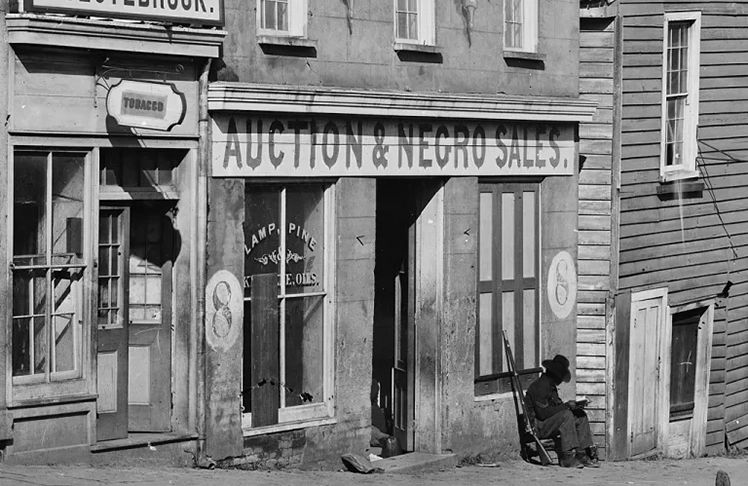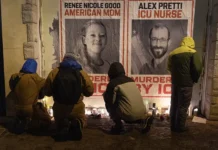
by Mustafa Ali
The lie doesn’t even flinch anymore.
Not when a president of the United States stands behind a podium — dripping with power, drenched in arrogance — and dares to suggest that slavery had “benefits.” That it taught skills. That the shackle was somehow a syllabus. That the whip was an educator. That the plantation was a vocational school in disguise.
It is not simply offensive. It is not just false. It is dangerous. Because every empire begins to rot when it forgets — or chooses to erase — how its wealth was built, how its walls were stacked atop the bones of the beaten.
This isn’t about history. It’s about power.
When Trump or any politician tries to whitewash slavery, they are not engaging in some academic revision of the past. They are wielding language like a blade, slicing at the truth to protect a narrative that keeps the powerful perched high and the rest of us drowning in amnesia.
Slavery was not a job training program.
It was theft. Of labor. Of lineage. Of language. Of life.
It was not about productivity.
It was about ownership. It was the cold-blooded, legally sanctioned, generational abuse of human beings for profit.
It was rape, not romance.
Terror, not training.
To suggest otherwise — to spin a blood-soaked truth into a flag-wrapped fable — is not just miseducation. It is psychological warfare.
It is the gaslighting of an entire nation.
And here we are, again.
Slavery was not a job training program.
Because this country has a habit. A habit of hosing down its sins with patriotism. Of repackaging brutality as benevolence. Of rebranding genocide as “discovery.”
Of telling the enslaved that they should be thankful.
But what happens when you let the lie sit too long?
It gets comfortable. It starts teaching in classrooms.
It starts showing up in textbooks and policy briefings and State of the Union addresses.
What happens when the lie gets a microphone?
It becomes policy.
It becomes erasure.
They’re laying the groundwork for future atrocities.
And that’s what this is — a calculated erasure.
When Trump and his allies sanitize slavery, they aren’t just trying to manipulate memory. They’re laying the groundwork for future atrocities.
Because if bondage had benefits… maybe incarceration does too.
Maybe the border camps are just summer school.
Maybe forced labor behind razor wire is just rehabilitation.
Maybe colonization was just a lesson plan.
Maybe what’s happening in D.C. today—the military occupation, the purging of unhoused people from view—is just tidying up for the next tour group.
See how the logic works?
This is the playbook of autocrats: control the narrative, and you can control the nation.
But there’s a deeper wound here.
Because this isn’t just about Trump. This is about America’s refusal to tell the truth about itself.
About how often this country would rather comfort the comfortable than confront the uncomfortable.

And the truth is uncomfortable.
It is barbed.
It does not fit neatly in a campaign speech.
It is not taught evenly across states.
So here is the ugly truth, that slavery was one of America’s original sins, but also its original blueprint.
It wasn’t an aberration. It was the business model.
The economic engine. The political foundation.
The justification for the Electoral College.
The architect of our racial wealth gap.
And yes, the echoes still live in our lungs.
In the redlined neighborhoods.
In the underfunded schools.
In the polluted air that Black and Brown children breathe.
In the prison labor used to manufacture the furniture in government buildings.
In the fact that we still have to say Black Lives Matter and be met with skepticism.
This isn’t about revisiting the past for the sake of pain.
To whitewash slavery is to whitewash everything that followed.
To cleanse the crime scene so the murderer can write the memoir.
But the bones won’t stay buried.
They rise every time we march. Every time we teach the unapproved history. Every time a poem dares to remember what the textbooks forgot. Every time we say the names they try to erase.
Because this isn’t about revisiting the past for the sake of pain.
It’s about rescuing the truth from the fire.
It’s about refusing to let those who oppressed us rewrite themselves as saviors.
It’s about justice.
And justice begins with memory.
With honest memory.
So when a president tries to whitewash slavery, he is not just insulting Black people—he is attacking the very idea of democracy.
Because democracy demands truth.
And truth demands courage.
The kind of courage that doesn’t flinch in the face of backlash.
The kind of courage that doesn’t confuse silence for civility.
The kind of courage that knows that freedom cannot be built on lies.

So let us speak plainly:
Slavery was a horror.
Whitewashing it is hate.
And if we are to move forward — truly, righteously — we must call it what it was.
And we must remember, not for shame, but for liberation.
Because only a people who remember the fire can keep it from burning again.
And America is getting awfully warm.
Dr. Mustafa Ali is a poet, thought leader, strategist, policymaker, and activist committed to justice and equity. He is the founder of The Revitalization Strategies, a business focused on moving our most vulnerable communities from “surviving to thriving.” Ali was previously the senior vice president for the Hip Hop Caucus, a national nonprofit and non-partisan organization that connects the hip-hop community to the civic process to build power and create positive change.















